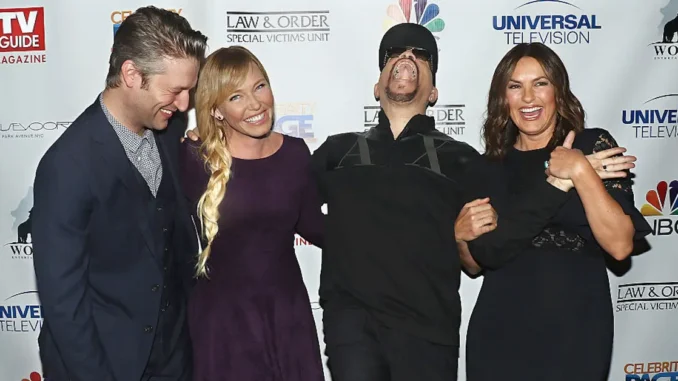
Mariska Hargitay, Ice-T, and the Cast of Law & Order: SVU Celebrate 400 Episodes

The amount of heavily hyped series grows with each TV season, but the real marker of television success is longevity. The cast and crew of Law & Order: Special Victims Unit know a little something about staying in the game. The ripped-from-the-headlines drama is one of the longest running of all time, and last night it celebrated a milestone few ever reach: episode 400. Taking over the top floor of the Gansevoort Park Avenue for an event hosted by TV Guide Magazine, SVU’s stars came out to toast nearly 18 years of success. “What a long, strange trip it’s been,” joked creator and executive producer Dick Wolf, who addressed the serie’s role as a New York institution. “It’s hard to believe the number of people who have been part of this show. It is a dream come true for me to have what is really a family in this city doing this show.”
Family was a recurring theme throughout the evening. As something of a rite of passage for actors, SVU is known for giving those starting out their first break and filling its episodes with prominent guest stars, many of whom came out to show their support. Alums like Harry Connick Jr., Peter Gallagher, and Dean Winters joined leads Mariska Hargitay, Ice-T, Kelli Giddish and Peter Scanavino in paying tribute to SVU’s lasting impact.
As series protagonist Detective Olivia Benson as well as the director of the 400th episode, Hargitay is at the heart of what makes SVU work, but she used her speech to call out the contributions of her team as a unit. “Obviously tonight’s celebration brings out a whole host of feelings for me,” said Hargitay. “As we touch down on number 400 it’s so hard even to say out loud with a straight face because it’s such a dream. I have so much pride and gratitude and I’m immensely proud of what we have done together as a team, as a show, and as a family.”
So, what makes a show stand the test of time? For Ice-T, who’s been a regular since the second season, SVU’s success lies in its commitment to focusing on issues not breached elsewhere on television. “The topics we deal with are real; we’re dealing with survivors,” he said. “This is therapy for a lot of people. They don’t just watch the show for entertainment, this is helpful [for them], and it’s very rare that you’re going to come up with content that’s going to stick with people.” The sentiment was echoed by Hargitay, who stressed not just the importance of the subject matter, but its timeliness: “Telling these stories bravely and carefully and accurately is more important than ever.”
